gun control

Last week, the Senate began a floor debate on gun control that brought to mind an earlier “floor debate” several months ago in Chaska, Minn.
Ever since our Community Dialogue on “Gun Violence in America,” I’ve searched for answers to what happened.
A crowd of 138 people came out on a Tuesday night to chime in following the tragedy at Sandy Hook in Newtown, Conn.
As the night wore on, it became clear that there would be no real dialogue, no moderated discussion. No give-and-take. A series of monologues, without interruption and with a time limit, was the best we could expect.
Fear, anger, hostility, and suspicion were in the room. The room was hot.
The months following have been a personal search for understanding of what happened that night, and how we in America move forward together on such a divisive issue.
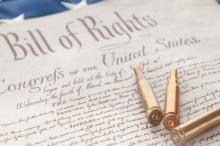
Meaning happens when the purposes of the writer come together with what the reader thinks is important. Since all aspects of any one thing cannot be perceived all at once, we focus our attention on this or that aspect of a thing depending upon what we want to achieve. This is why we can read a particular text many times and find new insights each time. This is also why we cannot agree on what the Second Amendment of the U.S. Constitution means.
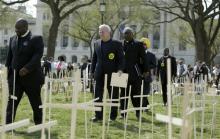
Clergy from California to Connecticut created a makeshift graveyard symbolizing victims of gun violence on the National Mall on Thursday as they exhorted Congress to pass legislation to limit access to firearms.
Standing in front of 3,300 grave markers — representing the number of people who have died in gun violence since December’s massacre in Newtown, Conn. — more than 25 ministers, rabbis and other religious leaders decried as “idolatrous” a society that values guns more than human life.
“We don’t have a Second Amendment issue,” said the Rev. Matt Crebbin of Newtown Congregational Church. “We have a Second Commandment crisis.
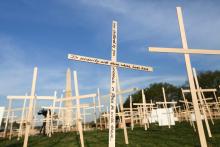
Today, on the National Mall, I stood with fellow faith leaders, including clergy from Newtown, to remember lives lost at Sandy Hook elementary school and the 3,364 gun deaths that have happened since.
We stood in front of a field of crosses, Stars of David, and other grave markers, and it broke my heart to think that each one stood for a life ended too soon. It doesn’t have to be this way. Commonsense steps to reduce gun violence are within our reach. Just today the Senate voted to begin the debate. But there is much work to do. Lawmakers need to hear from you.
This is one of the clearest examples of a stark democratic choice: the old politics of guns or the morality of the common good. The clergy are here today for the common good.

As the Senate takes up a heated debate over gun control and background checks, Catholic bishops have used the months since the Newtown school massacre to push gun control in email blasts and Senate Judiciary Committee testimony. But among the Catholic faithful, not everyone supports gun control measures.
Call them the NRA Catholics.
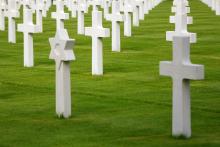
For many pastors of urban congregations, “stepping up” to end gun violence stems from a very personal place — as they have been forced to bury their own neighbors and church members. According to Samuel Rodriguez, gun violence – especially in urban areas – deeply affects interfaith leaders there, who are declaring violence-free zones and taking action.
Faith-based leaders in Philadelphia and Chicago have rallied to fight gun violence. Heeding God’s Call, based in Philadelphia, holds prayer vigils at the locations of gun homicides as well as organizes gun-store campaigns that ask gun store owners to sign a code of conduct.
In Chicago, All Saints Episcopal Church organized CROSSwalk, a walk through downtown Chicago, which drew a few thousand people the past two years. Violence on Chicago streets has killed more than 800 young people in the last six years.
Nuenke addressed breaking the chain of violence and pain that we see in every community. He quoted 2 Corinthians 1:3-4 and Isaiah 61 as examples of God’s compassion and its life-changing, healing power.
“What would happen if the body of Christ more fully was involved in living out Christ’s compassion in a broken world?” Nuenke asked. “Sometimes people who are hurt or experience violence end up hurting other people. The care and compassion they might receive from the Lord Jesus will impact them more in 20-30 years than anything else.”

The conversation yelling match around gun control is exhausting — both in terms of the ethical boundaries each side will breach to advance its cause, and the way our rhetoric has turned into an exercise in “crash-testing:” we always hit a wall in talking our good sense to the Dissenters, but are content to back up, add force, and try again. Because “One day, THEY will see the light. One day, THEY will become US”…
… crash!
The more gun violence we experience as a nation correlates to our panic in pursuit of the common good, however we define it. And get too many panicky people in a room – people who are certain they are right – and watch how skillfully they evade progress. I am a pastor in Chicago and I speak on behalf of all who serve in neighborhoods where violence has become the rule and not the exception: I am tired of you hitting the wall.
This course of action and righteous disrespect of Those-With-Their-Heads-You-Know-Where will not make us masters or better neighbors. It has made us dummies. And while we are arguing, our children are losing. In Chicago, and Baltimore, and Detroit, and Newtown, and in Washington. They are losing because we are competing to see who can make the wall topple over the other first. Because we are arguing over rights from the wrong perspective.

I have often wondered about the trajectories my life has taken. I was raised a Latino Pentecostal in New York City but educated in a liberal arts tradition at Columbia University in Manhattan. I was exposed to evangelical and then liberal Protestant traditions in seminary and graduate school. My theological views have changed over the years. I have moved from Pentecostal to Baptist to Congregational (United Church of Christ) church traditions.
Yet at each step of the way, I have been able to build on the solid foundations of the past in moving to new understandings for the new circumstances in my life. These life transitions never started from “scratch.” Some of these same tensions might have motivated Paul in considering, at least rhetorically, his past a “loss” in comparison to a new way of living and being in Philippians 3:4b-14.
...
In these days, what are the sources of such life-altering “new knowledge?” There are many places for us to turn. Though I grew up without guns, I was surrounded by plenty of gun violence in my inner city neighborhoods in the Bronx and Brooklyn. In the aftermath of the tragic losses of our children and educators in Newtown, Conn., I wonder if we have gained any new knowledge. Apparently, we live in a country that values the freedom to own guns, even overly powerful ones like assault rifles. “Second Amendment rights” are invoked as if our founders could predict the kinds of weapons that would be available to regular Americans today, even with the “militia” (local police forces) that we also have available to us.
As a mom of two small children – one who is the same age as children killed in Newton – I cannot imagine how hard it must have been for this dad to speak about his loss at the Senate Judiciary Committee recently about a proposed assault weapons ban. Thank you for your courage.
Now it's time to ask Congress to show some courage and enact sensible measures to prevent gun violence. Too many parents have already lost their children.
Visit NBCNews.com for breaking news, world news, and news about the economy
Mary Sanchez, op-ed writer for the Kansas City Star, offers in her column something many of us probably didn’t know:
“There’s a little-known fact about guns in America, and it’s one that the firearms industry and its political allies don’t like to dwell on: The rate of gun ownership in America is declining.
“This has been the case for decades. Rates peaked way back in the 1970s, the era of disco balls and bell bottoms. In 1977, 54 percent of American households reported owning guns. In 2010, the last time the General Social Survey data was compiled, the percentage had shrunk to 32.”
Sanchez concludes that the strong opposition to anti-gun violence measures is driven more by the need of gun manufacturers to sustain their market than it is about the Second Amendment.

My city of Chicago, known as the City with Big Shoulders, is now on its knees. But it’s not prostrate in some humble submission to God. No. Instead Chicago is weeping from the emotional exhaustion of having to bury too many youth who have been murdered.
Last year Chicago recorded 2,400 shootings and more than 505 murders, of which more than 108 were teenagers of color from seven violent communities. Already 2013, with less than two months into its birth, has seen 49 murders. Those of us on the ground seeking to bring change to this pandemic of violence know that if the Chicago cold winters are this violent, then the hot summers will not cool off. On top of the hard and constant news about those who are killing and being killed, Chicago Police stats show that only 34 percent of the murders get solved within one year. If the detectives have two years on a case, then the rate barely reaches 50 percent. The national average of murders solved is 64 percent. New York’s rate is only 60 percent. In Chicago, though, one has a 50-50 chance of getting away with a murder.

In the 1980s television show, “Fantasy Island,” the island watchman heralded the arrival of individuals attempting to escape their reality with a call of “the plane … the plane … the plane!”
In the weeks since the Sandy Hook tragedy, I’ve spent much of my time in Washington, D.C., preaching about our moral mandate to reduce gun violence, especially in our urban neighborhoods. However, in my time in the capital, I have come to feel as though there are many arriving in Washington on the proverbial plane, escaping the realities of their hometowns, for the Fantasy Island in the beltway.
In the Book of Proverbs, we read, “Buy the truth — don't sell it for love or money; buy wisdom, buy education, buy insight (Proverbs 23:23, The Message).”
Sadly in Washington, truth seems to be for sale; wisdom seems to be radically individualized; education seems to be mocked; and insight seems to be unable to breach the partisan walls in our nation’s capital.

Death doesn’t make sense — especially when it interrupts the life of one so young. Richard Twiss was only 58 years old.
It makes me think: Richard was one life, cut short by a heart attack. What about all the images of God erased from our lives and families every year through gun violence in the U.S.? What about their families and pastors and youth groups who held vigils in waiting rooms across the country? What about the estimated 1,793 gun deaths since the Newtown massacre? How valuable are their lives?

A well-known restorative justice film, "A Justice That Heals" recounts the role of faith and the church in caring for the families of both a murderer and his victim. The film climaxes in the mother’s act of forgiveness and counsel to the young man who killed her son. The power of that image of repentance, reconciliation, and restoration almost obscures another dimension of the grieving family's response to the death of their son. The victim's father resigns his job and becomes the director of an advocacy group for gun control.
The late Carl Dudley demonstrated in his research on mobilizing congregations that communities of faith rally to advocacy only after they have generated sufficient energy about and engagement with those affected by the policy. Congregations care about people not policy, stories over statistics, and narratives before numbers. Even the civil rights movement found its genesis in the story of Rosa Parks, and others like her, rather than in the "ethics" of segregation and discrimination. So, like the family in "A Justice That Heals," our work to mobilize around gun control requires creating a climate where people's experience with those who are victimized by bad policy.

What do we do? How do we stop this?
“Motorists and walkers scattered in terror Monday night as a gunman fired two bursts of bullets at passing vehicles near an Oakdale grocery store, killing a 10-year-old boy and wounding two other people. Click HERE for the Star-Tribune story.
We can‘t stop it. America is an arsenal with an open door. And any attempt to close the door is “unconstitutional.” Liberty, one of three basic rights outlined by The Declaration of Independence, is killing the other two. “Liberty” trumps not only “the pursuit of happiness” but “life” itself.
“At least two vehicles struck by bullets sped into the parking lot of the nearby Rainbow Foods at 7053 10th St. N. seeking help.”
Responsible gun owners did not do this. An irresponsible gun owner did this. But it would have made not one ounce of difference if the passersby had been armed. They were sitting ducks, like the ducks in a carnival booth. There is no protection against irresponsible use of a firearm.
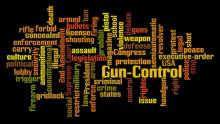
Red, white, and blue. Pick-up trucks. Apple pie. Baseball. Church on Sunday. And guns. You can't get much more American than that, or so it seems here in Montana. This week a regional newspaper posted on Facebook looking to find proponents of greater gun restrictions for an article they were writing. Within minutes the request was laughed at, belittled, and deemed unlikely. Truth is, even if someone did lean toward greater gun control, they never would have publicly responded. To utter such absurdities is equivalent to branding yourself anti-freedom, anti-American, and even anti-Christian. To listen to the rhetoric, gun control of any kind is nothing more than an eager embrace of Nazi-fascism, Chinese-communism, and the demise of all things American. And surely God would disapprove.
Which makes me wonder: what would God say about gun control? Not in some sort of glib WWJD-type platitude, nor in an entangled concoction of American freedom and Christian theology. And definitely not in a sensationalized proof-texting approach to scripture. But honestly, can our faith inform this conversation? And should it?
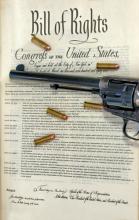
How did this gun-owner-since-he-was-eight find himself at a prayer vigil to end gun violence on the steps of the Michigan state capitol? The easy answer is that Michigan Prophetic Voices, a nonpartisan, statewide organizing clergy group invited me to be there. But I had another reason.
In my family owning a gun was explained as a rite of passage, not as a Second Amendment right. When my father handed me my first gun he said, "You are old enough now to learn how to use this safely. There is one thing you have to promise me: never point it at anyone. If you do, I will take it away for good." I made the promise.
The man who said those words had heard different words from his father. "Never steal another man's property," my grandfather had told my dad, "and if it's yours, you fight like hell to keep it."
Those words shaped events of an early August morning in the 1970s when both of those men leveled shotguns at would-be burglars in the family business and, out of fear for their own lives, fired. One of those 20-something men was killed.
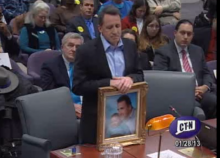
We know we are addicted to something when that behavior damages our relationships with people. When alcohol, drugs, food, gambling, or work is more important than mother, father, husband, wife, child, friend, or neighbor, we know we have a problem. Similarly, we know that we are worshipping an idol when a created thing becomes more important than the Creator, when we put our faith in our fears and a dead thing that cannot love us back becomes the object of our ultimate concern. We know we are worshipping an idol when our devotion fails to cause us to love and to respect our neighbor.
In a Connecticut hearing about gun violence, Neil Heslin — a father whose son died in the mass shooting at the Sandy Hook Elementary School —asked why any one individual citizen needs military-style assault weapons and high-capacity magazines. People in the room answered by quoting the Second Amendment. In this case, the Second Amendment was more important than this father’s pain. Their lack of respect for his pain indicated a deficit of both compassion and love, not only for this grieving father but for a grieving nation.
Let us be clear. The Second Amendment is not holy writ, and a gun is not God. Far too many Americans have made these created things, these inanimate objects more important than the compassion we ought to have for one another. This is fetishism. This is idolatry. This is morally wrong.
The Senate Judiciary Committee held its first hearing on gun control in the new Congress this morning. The first witness was former Rep. Gabrielle Giffords, D-Ariz., who survived being shot in the head two years ago.
Here, via CBS News, is her statement.
"Thank you for inviting me here today. This is an important conversation for our children, for our communities, for Democrats, and Republicans.
"Speaking is difficult but I need to say something important.
"Violence is a big problem. Too many children are dying — too many children. We must do something.
"It will be hard. But the time is now. You must act. Be bold. Be Courageous. Americans are counting on you. Thank you."
Other witnesses included Gifford’s husband Mark Kelly, James Johnson, chief of police for Baltimore County, Md., and chairman of the National Law Enforcement Partnership to Prevent Gun Violence, and Wayne LaPierre, CEO and Executive Vice President of the NRA.
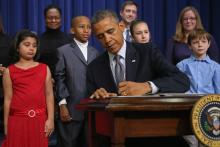
When I was a little girl, my mother and I prayed together every night:
Now I lay me down to sleep.
I pray the Lord my soul to keep.
If I should die before I wake,
I pray the Lord my soul to take.
And then I would ask God to bless a list of people who were on my mind.
Every night I spoke about my own death, but death was not real. It never occurred to me that I would die or that my parents would die.
One day when I was in the fifth grade, we heard gun shots outside our school. Our teachers did not let us go outside for recess that day because a woman had been killed, caught in the crossfire of a domestic dispute between her son and his wife. By the time school was out, the body had been removed; there was no yellow crime scene tape. There was still blood on the ground to mark the spot of this tragic death. The next day it would be washed away.